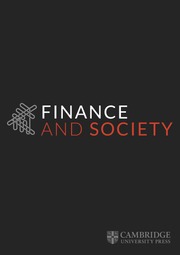Article contents
Financial times: Competing temporalities in the age of finance capitalism
Published online by Cambridge University Press: 09 November 2023
Abstract
This special issue explores how finance deploys time, structures the future, and interacts with actors and institutions that sometimes function according to very different temporal regimes. Finance capitalism's logic of recurrence, repetitive cycles, and successive ruptures has long been with us, but the essays in this special issue are particularly interested in how recent decades of intensified financialization have restructured temporal experience. They interrogate the production and dissemination of agency in an age of acceleration, risk, and uncertainty, asking how the temporality inscribed in financial transactions emerges from and simultaneously shapes individual and social practice. Topics covered range from the logic of finance and foundational concepts of financial theory to the intersection between objective structures and social practice, the role of literature, and finally questions of social insecurity, political action, and the possibility of resistance within a context of competing temporalities. In this introduction, the editors delineate some fundamental concepts and questions for our financial times.
- Type
- Editorial
- Information
- Creative Commons
- This is an Open Access article, distributed under the terms of the Creative Commons Attribution-NonCommercial-No Derivatives licence (http://creativecommons.org/licenses/by-nc-nd/4.0/), which permits noncommercial re-use, distribution, and reproduction in any medium, provided the original work is unaltered and is properly cited. The written permission of Cambridge University Press must be obtained for commercial re-use or in order to create a derivative work.
- Copyright
- © 2018 The Author(s)
References
- 4
- Cited by


